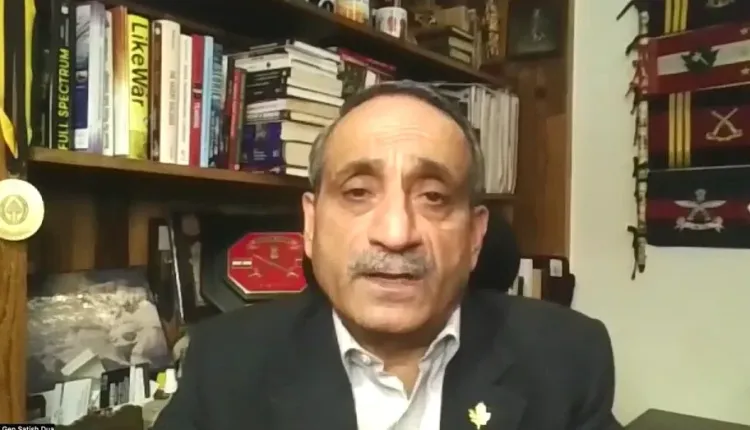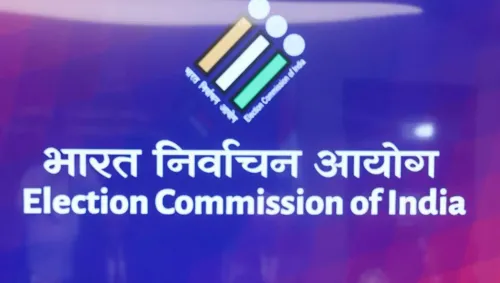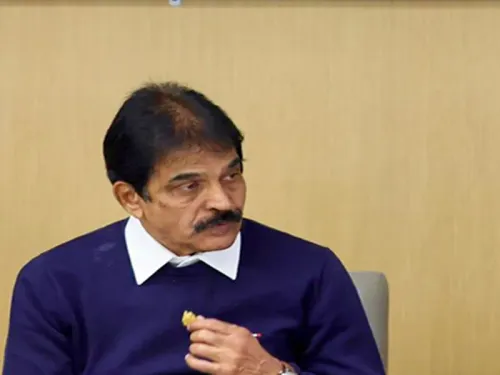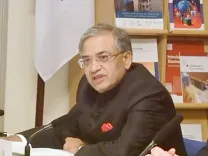Has 'Operation Sindoor' Increased the Cost of Terrorism Support for Pakistan?

Synopsis
Key Takeaways
- Operation Sindoor was a direct response to the Pahalgam attack.
- The operation targeted terrorist command centers in Pakistan.
- It aimed to raise the cost of terrorism support for Pakistan.
- India's military approach is now more assertive yet measured.
- The operation seeks to control and manage terrorism in the Valley.
New Delhi, May 10 (NationPress) In an exclusive conversation with IANS, Lieutenant-General (Retired) Satish Dua, who served as the Corps Commander during the surgical strikes following the Uri attack, provided his perspective on 'Operation Sindoor', a military response initiated after the tragic Pahalgam attack where 26 individuals were brutally killed by terrorists. He emphasized that 'Operation Sindoor' has significantly increased the cost of supporting terrorism for Pakistan.
During a comprehensive discussion with IANS, he explored the strategic implications, the symbolism behind the operation, and the message it conveyed, while also reflecting on Pakistan’s ongoing provocations and India’s measured military stance.
Here is the complete interview:
IANS: What is your assessment of the outcomes of Operation Sindoor?
Lt. Gen. Satish Dua: Operation Sindoor was executed in retaliation to the horrific violence at Pahalgam. Pakistan has orchestrated numerous such attacks through terrorist infiltration. The initial significant assault occurred at Uri, where our soldiers lost their lives. At that juncture, I was the Corps Commander overseeing the surgical strikes, a mission that marked our first incursion into terrorist camps across the border, with a depth of 4-5 kilometers.
Subsequently, following the Pulwama attack, we conducted a deeper strike in Balakot. However, during the Pahalgam incident, the terrorists specifically targeted tourists based on their religion and gender—a despicable act. In retaliation, we implemented several significant measures, such as invoking the Indus Water Treaty, along with visa cancellations, closure of border gates, and reductions in High Commission staff, complemented by robust diplomatic actions. A high-level meeting chaired by the Prime Minister led to an announcement of a forthcoming military response.
Two weeks later, 'Operation Sindoor' was initiated. Unlike previous offensives, this time our focus was on the terrorists' command centers, hubs, and training facilities across nine sites. This was the clear objective of 'Operation Sindoor'.
The terrorists targeted men and spared women, making the symbolism of 'Sindoor' resonate throughout India. Operation Sindoor was designed to be non-escalatory; we solely focused on terrorist hideouts, avoiding civilian or military installations. Thus, the responsibility for escalation lies with Pakistan.
IANS: Those terrorists and their leaders who instructed the wives of Pahalgam martyrs to “Go tell Modi,” did they receive a response?
Lt. Gen. Satish Dua: Certainly. The phrase “Modi ko bata dena” gained notoriety. At that time, Prime Minister Modi was in Saudi Arabia, and he promptly curtailed his visit to return and convene a high-level meeting, resulting in the aforementioned actions. Within 14 days, significant measures were undertaken that had never occurred before.
The headquarters of Jaish-e-Mohammed in Bahawalpur were obliterated, along with the Lashkar-e-Taiba headquarters in Muridke, located just 30 kilometers from Lahore. Both cities are home to the Pakistan Army Corps Headquarters. Our ability to strike these terrorist command centers indicates our capacity to target military headquarters as well, conveying a powerful, concealed message that I am confident Pakistan’s military comprehends.
IANS: Has Pakistan learned anything from this experience?
Lt. Gen. Satish Dua: Pakistan has a history of misadventures. Despite defeats in 1947-48, 1965, and the substantial loss in 1971—when their nation fractured and 93,000 soldiers surrendered in a formal ceremony, an event unprecedented since World War II—they still project these events internally as victories.
Post these conflicts, they initiated a proxy war. Have they truly learned their lesson? The straightforward answer is 'No.' However, for the first time, we are contemplating leveraging water resources. Previously, during three wars and the Kargil conflict, we refrained from doing so to avoid harming the common people and farmers in Pakistan. Now, we are prepared to take that step, and its effects will surpass any kinetic or non-kinetic strikes.
Nevertheless, I remain skeptical that they will learn. Why? Because the Pakistan military thrives on anti-India sentiment. They have established an empire beyond mere military duties, which they are unlikely to relinquish. Kashmir remains the unifying factor for Pakistan.
Currently, Pakistan is grappling with issues such as the Baloch conflict, the Pashtun dilemma, the TTP rebellion, financial turmoil, and public dissatisfaction. Their most popular leader is incarcerated, and the uneasy coalition is managed by the Army Chief who now holds the reins of power. Their only recourse is to vilify India, which unites the populace against their military.
IANS: Pakistan is targeting civilians along the border. What should our strategy be?
Lt. Gen. Satish Dua: Our strategy is unequivocal. Both Defence spokespersons and the foreign secretary have reiterated that our response is consistently measured, restrained, and non-escalatory.
In response to the Pahalgam massacre, we committed to targeting their command centers and terror networks. Following this, they deployed 400-500 drones, all of which we successfully neutralized without incurring casualties. Yes, we did experience some losses along the Line of Control. In their frustration, they resorted to attacking civilians. We have always maintained that the responsibility for escalation rests with them; when they escalated, we targeted their air defense systems, leading to the destruction of Lahore's air defense.
IANS: Has effectively attacking a nuclear-armed state enhanced India’s reputation and defense capabilities?
Lt. Gen. Satish Dua: At present, India is undertaking the right actions, in the right manner, at the right moment. We are not seeking a status symbol or reputation; we are doing what aligns with our national interests.
IANS: Has Operation Sindoor undermined Pakistan’s nuclear deterrent perception?
Lt. Gen. Satish Dua: That’s a challenging question. Has it dismantled the nuclear deterrent perception? No, Pakistan’s nuclear capability remains intact, just as ours does. However, the critical inquiry is whether the nuclear option can be exercised.
The global community recognizes Pakistan as the epicenter of terrorism. There exists no existential threat to Pakistan; they are the aggressors while we are in a defensive posture. There is no justification for them to employ the nuclear option.
IANS: Has India demonstrated its superiority in air defense?
Lt. Gen. Satish Dua: The evidence is clear. Not a single drone attack succeeded; all drones were neutralized without any damage inflicted. They may have been testing our air defense system for vulnerabilities, but what they discovered is a robust, integrated air defense grid.
IANS: What impact will Operation Sindoor have on terrorism in the Valley?
Lt. Gen. Satish Dua: The eradication of terrorism in the Valley is not an overnight process. Nonetheless, we must escalate the costs for Pakistan to such an extent that they can no longer sustain support for terrorism. It cannot be said that terrorism will be entirely eradicated, but we must work toward reducing it to a manageable level. Some radical elements will persist, and some support from Pakistan will always endure. Therefore, I do not foresee a swift resolution. However, we must ensure it remains contained.
For instance, we targeted terrorist headquarters located in densely populated areas. This also sends a message to Pakistani civilians: do not tolerate terror hubs near your residences. We are raising the stakes for Pakistan.
IANS: How many days will it take for India to overcome Pakistan?
Lt. Gen. Satish Dua: That is an overly simplistic question. The timeline depends on escalation dynamics, which we refer to as escalation dominance. Our goal is to manage these escalation metrics. Hence, there is no straightforward response to the question of “how many days” it would take.










